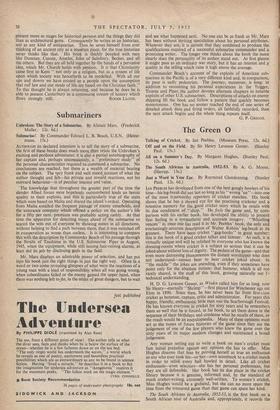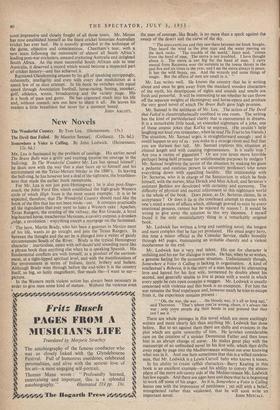The Green 0
Talking of Cricket. By Ian Peebles. (Museum Press. 12s. 6d.) IAN PEEBLES has developed from one of the best googly bowlers of his time—his leg-break did not last so long as his "wrong 'un"—into one of the most trustworthy reporters of cricket matches. His book shows that he has a shrewd eye for the practising cricketer and a retentive memory for the_good cricket story which he retails with its due condiment of "shop." He feels the game and, by com- parison with his earlier book, has developed the ability to present that feeling in a sympathetic and accurate imagery. "Whistling venom" is, once one has read it in Mr. Peebles' book, the only and everlastingly accurate description of Walter Robins' leg-break at its greatest. There have been cricket "gag-books" in great number: this is the book of a good cricket talker and listener. As such, it is virtually unique and will be relished by everyone who has known the dressing-rooms where cricket is a subject so serious that it can be joked about without loss of dignity. The pedant of the game—and that even more distressing phenomenon the distant worshipper who does not understand—cannot bear to hear cricket joked about. In "the middle" the jokes are unending, even if they sometimes have point only for the absolute initiate: that humour, which is all too rarely shared, is the stuff of this book, growing naturally out f technical understanding.
H. D. G. Leveson Gower, as Wisden called him for so long, now Sir Henry—eternally "Shrimp"—first played for Winchester aga nst Eton in 1890. Since then, he has never been far from first-class cricket as batsman, captain, critic and administrator. For years this happy, friendly, enthusiastic little man was the Scarborough Festival. He has known everyone in cricket for sixty years and he remembers them so well that he is forced, in his book, to set them down in the sequence of their birthdays and condense what he recalls of them, or the result would be an encyclopaedia. Many of these opinions must act as the bones of future histories of the game since they are the judgement of one of the few players who knew the game over the sixty years of its major modern changes and maintained a broad judgement.
Any woman setting out to write a book on men's cricket must face initial prejudice against any opinion she has to offer. Miss Hughes disarms that bias by proving herself as true an enthusiast as any who ever took his—or her—own scorebook to a cricket match in order to relish every ball bowled in detail. Like all cricket enthusiasts—even selectors—she has her personal preferences, but they are all defensible. Her book has its due place in the cricket library because it is genuine, informed and, by the standard of much cricket-writing, extremely well-written. To women's cricket, Miss Hughes would be a godsend, but she can no more spare the time from the trousered game than that game can spare her kind.
The South Africans in Australia, 1952-53, is the first book on a South African tour of Australia and, appropriately, it records the most impressive and closely fought of all those tours. Mr. Moyes has now established hiMself as the finest cricket historian Australian cricket has ever had. He is soundly grounded in the technique of the game, objective and conscientious. Cheetham's tour, with a new team following the retirement of almost all South Africa's leading post-war cricketers, amazed cricketing Australia and delighted South Africa. As the most successful South African side to tour Australia, it deserved a record which would become a respected part ,of cricket history—and has achieved. it. Raymond Glendenning amazes by his gift of speaking untrippingly, coherently, intelligibly and even with every due modulation at a speed few of us dare attempt. In his book he switches with equal speed through Association football, horse-racing, boxing, snooker, golf, athletics, tennis, broadcasting and the variety stage. His is a book of pace and gusto. He has crammed much into his life and, without conceit, sets out here to share it all. He leaves his readers a little breathless but never for a moment bored.
JOHN ARLOTT.



























































 Previous page
Previous page